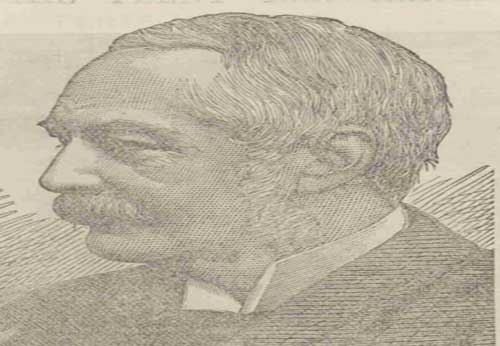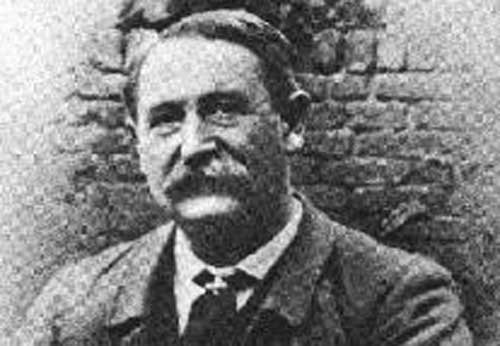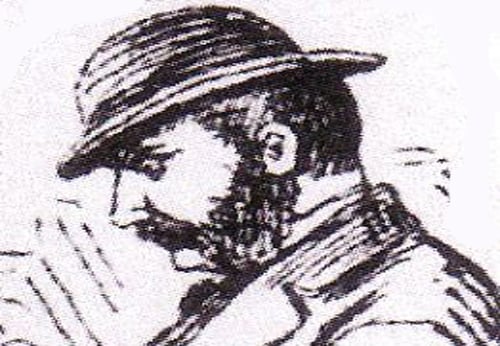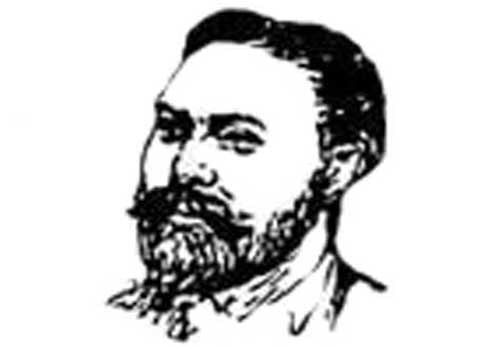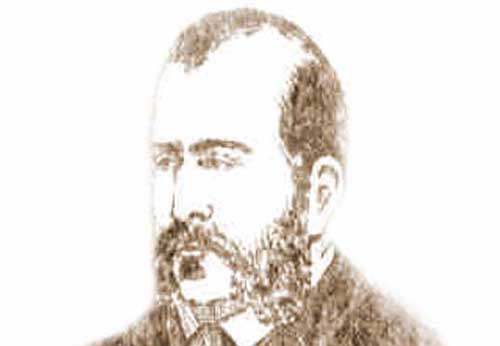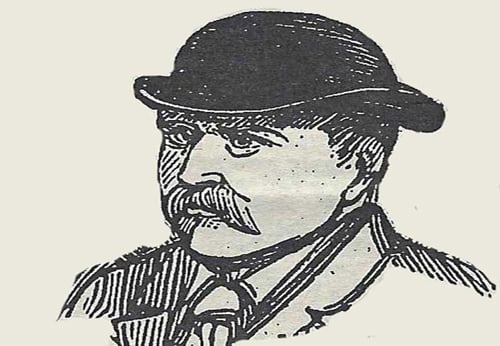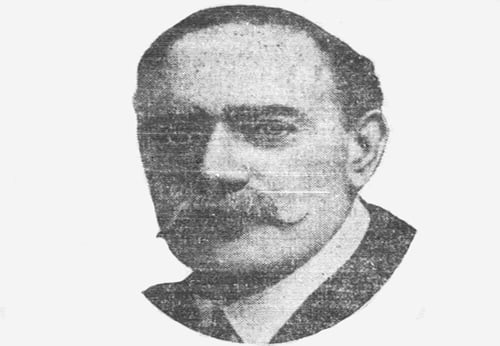- Superintendent Thomas Arnold was the head of the Metropolitan Police's H Division.
- Although he was on leave when the early murders took place, he had returned by the time of the murder of Elizabeth Stride, on 30th September, 1888.
- His most controversial decision was to order the erasure of the Goulston Street graffito.
- He retired from the police in 1893.
- Site Author and Publisher Richard Jones
- Richard Jones
SUPERINTENDENT THOMAS ARNOLD
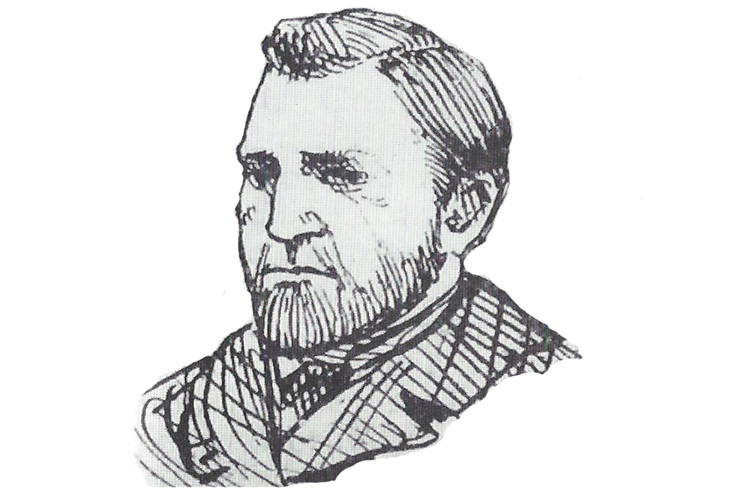
THE HEAD OF H DIVISION
Superintendent Thomas Arnold was the head of H Division, Whitechapel, at the time of the Jack the Ripper atrocities, albeit he was away on leave during the earlier murders of Martha Tabram and Annie Chapman, returning to duty just prior to the murder of Elizabeth Stride, on 30th September, 1888.
On that same morning, Catherine Eddowes was murdered in Mitre Square, and the killer fled east, leaving a piece of the Mitre Square victim's apron in a doorway in Goulston Street.
This same doorway also contained the notorious chalked message, "The Juwes are the men that will no be blamed for nothing" and it was Arnold, as the highest-ranking officer at the scene, who, initially, gave the controversial order to erase the graffito before a photographic record of it could be taken.
However, controversial decisions aside, Superintendent Thomas Arnold appears to have impressed all who worked with and under him, and, when he retired from the Metropolitan Police, in 1893, many of them were fulsome in their praise of "the manner in which he had always discharged his duties while at the head of the H Division."
HIS EARLY CAREER
Thomas Arnold first joined the Metropolitan Police on 19th March 1855. However, that September he resigned and volunteered for service in the Crimean War.
On 29th September, 1856 he rejoined the Metropolitan Police (warrant number 35059) and was assigned to H Division, where he was made a Sergeant in the early 1860's
On 14th March, 1866, he was promoted to Inspector and transferred to The Metropolitan Police's B Division, which covered the districts of Westminster and Pimlico. Here he was promoted again to the rank of Chief Inspector.
TRANSFERRED BACK TO H DIVISION
In 1874, he went back to H Division as a Chief Inspector.
The East London Observer, in its edition of Saturday, May 29th, 1875, published the following article about the farewell dinner that was given for him by the people of Westminster and Pimlico. The article also enlightened the people of Whitechapel as to what they could expect from the returning Chief Inspector, Thomas Arnold:-
PRESENTATION TO POLICE SUPERINTENDENT ARNOLD
On Thursday evening week a large number of gentlemen sat down to dinner at Mr. Pethick's, the King's Arms, Ranelagh-road, Pimlico, having assembled to meet Mr. Superintendent Arnold, of the H division of police, formerly chief inspector of the B division, for the purpose of presenting him with a testimonial as a token of the appreciation in which he was held by the inhabitants of Westminster and Pimlico.
...The Chairman gave the usual loyal and patriotic toasts, and then went at once to the toast of the evening - the "Health of Mr. Superintendent Arnold."
In doing so, he called attention to the fact that testimonials to police officers while in the service were not permitted by the Commissioner without there were special circumstances connected therewith, and in this instance Colonel Henderson had granted his permission.
It was almost unnecessary for him to pass any encomiums on Mr. Arnold, for he was so well known to all of them that they would be useless.
For the nine years he had been an inspector of the B division he had always done his duty impartially and to the satisfaction of those with whom he had been brought into contact.
He had treated rich and poor alike, and, to prove the estimation in which he was held, they had met that night to present him with the magnificent watch and clock they saw before them.
He then, amid loud applause, handed the testimonial to Mr. Arnold. It consisted of a handsome drawing-room clock, in ormolu and light blue enamel, also a massive gold watch, which bore the following inscription:- "20th May. 1875. To Mr. Thomas Arnold. Presented by the inhabitants. of Westminster and Pimlico as a mark of their appreciation of the impartial, zealous, and courteous manner in which he has performed his duty as chief inspector of the B division of police." A very handsome gold chain, with seal, key, and locket, was attached to the watch. The whole were supplied by Mr. Tunstall, 69, Brompton-road.
The toast having been drank with musical honours, Mr. Arnold rose, amid loud applause, to return thanks.
He was almost at a loss for words to thank them, so surprised was he at the reception he had met with.
He had certainly endeavoured to carry out his arduous duties in as satisfactory a manner as he possibly could, and although everybody would not be pleased perhaps, he had the satisfaction of knowing that even if any existed that were not pleased, they would be but an atom as compared with the number of his friends.
He was happy to say that the cordiality that should exist among all classes of the community existed in a more marked degree between the police and the public day by day, and the want of reciprocity that had existed between them heretofore was becoming a thing of the past; and if they wanted to get on comfortably, they must endeavour by a mutual assistance to keep this state of things in existence.
He should always look with pride and satisfaction on the handsome presents that had been made him, and trusted he might live long to look upon them in the happy remembrances of that evening.
Although removed a long way from them, his heart was not absent from them, and he hoped that the South Belgravians would not consider it derogatory to their position to visit the Whitechapelets (laughter); at any, rate, he saw no more objection to their going East of Temple Bar than his coming West of it.
After some further remarks, Mr. Arnold sat down amid loud cheers.
...The Chairman then proposed "The Metropolitan Police," and in doing so endorsed the sentiments of Mr. Arnold as to the arduous nature of their duties and the fact that they could be considerably lightened by a mutual understanding with the public.
...Mr. Arnold joined the B division nine years ago as inspector, and, having passed the grade of reserve inspector, was appointed temporary (we may almost call it permanent) chief inspector in the absence of Chief Inspector Humphreys, on duty at the International Exhibition.
On the death of Mr. Butt, superintendent of the V division, Mr. Digby, of the H division, was removed to Wandsworth to fill the vacancy, and Mr. Arnold was appointed to the H division vice Digby. He has been in the Metropolitan Police nearly 18 years."
CASES THAT HE WORKED ON
Having, evidently, impressed his superiors he had soon been made the Superintendent of H Division, a post he would hold until his retirement in 1893.
Over the next 18 years he would build a solid reputation as head of H Division and he would work on some major East End cases, including the murder of Miriam Angel by Israel Lipski, in 1887, and, of course, the Jack the Ripper murders.
THE GOULSTON STREET GRAFFITO
As the highest ranking local officer on the majority of the Whitechapel murders, he made some important decisions, not least - and perhaps most controversially - the initial decision to erase the Goulston Street graffito before it could be photographed.
Although he was opposed in this action by several other police officers, notably the detectives from the City of London Police in whose jurisdiction Catherine Eddowes had been murdered, Arnold was backed by the Chief Commissioner of the Metropolitan Police, Sir Charles Warren, and the message was erased at 5.30am on 30th September, 1888.
Defending his actions, in his report to the Home Office, on 6th November, 1888, Arnold stated that:-
I beg to report that on the morning of the 30 September last my attention was called to some writing on the wall of the entrance to some dwellings No. 108 Goulston Street, Whitechapel which consisted of the following words: "The Juwes are the men that will not be blamed for nothing", and knowing in consequence of suspicion having fallen upon a Jew named 'John Pizer' alias 'Leather Apron' having committed a murder in Hanbury Street a short time previously, a strong feeling existed against the Jews generally, and as the Building upon which the writing was found was situated in the midst of a locality inhabited principally by that Sect, I was apprehensive that if the writing were left it would be the means of causing a riot and therefore considered it desirable that it should be removed having in view the fact that it was in such a position that it would have been rubbed by persons passing in and out of the Building.
HIS RETIREMENT
Superintendent Thomas Arnold announced his retirement from the Metropolitan Police in early 1893.
Just before Arnold left the force, a journalist from the Eastern Post and City Chronicle managed to secure an interview with the outgoing chief of H Division, which was published in its edition of Saturday, 3rd February 1893:-
"And so," commenced our man, "you are going to leave the service?"
"Yes," replied the Superintendent, "after having been in it for eight and thirty years."
"You've had some curious experiences during that time?" ventured the reporter.
And then the Superintendent commenced the story of his career.
Here it is.
"It was in 1855 that I first joined the force as a police-constable in the D Division.
Curious-looking policemen, you would have said we were, had you seen us then, with our heavy tall hats, our frock-coat tunics, our rattles, and our batons in our pockets.
But I wasn't much impressed with the police force at that time, and when the opportunity offered I volunteered for service in the Crimea, and was attached for some time to the Commissariat department at Varna.
I returned to this country in 1856, and commenced my connection with the East End by becoming a police-constable in this division.
A short period of service there was followed by my removal to Shadwell, where I formed one of the body of 80 men who were put on to special service during the Bryan King riots.
You remember them, of course?
No? Well, Bryan King was a clergyman of very High Church propensities, so much so, that he and his followers were called Puseyites. People used to flock to St. George's Church, more often for the purpose of kicking up a row than taking part in the devotional service, and at last, so riotous became the congregations, that the aid of the police had to be called in, and for something like twelve months, at every service, a body of 80 of we police was marched into the church, and had to stay there till the service was finished.
Another period of service at Arbour Square, where I was promoted to the rank of sergeant, was followed by me being drafted to Bow.
I was serving there during the time of the murder of Briggs by Muller on the North London Railway, and was called into the "Mitford Castle" to see the dying man, whose head was literally battered in.
Muller, the murderer, fled to New York, and was subsequently captured.
From Bow I was drafted to the B Division in Westminster, where I was promoted to an Inspectorship, and, after a little excitement there during the time of the Fenian scare, I was sent back to the H Division as the Chief Inspector.
That was in 1874, so that I have now had a continuous association with the H Division as Chief Inspector and Superintendent for eighteen years.
The first exciting event I remember, while acting in that capacity, was the explosion at the Tower, resulting in the capture of Burton and Cunningham.
Detective Abberline was on special service at the time, and it was entirely owing to his prompt action in closing the gates of the Tower that Cunningham was caught - a capture which ultimately resulted in the taking of his colleague, Burton.
Among the more notable events in which I have had to take an active part since then, have been the great Dock Strike of 1889, the capture of Lefroy, the murderer, the Lipski murder, the "Black Tuesday" of 1885, when, after the Trafalgar Square Riots, all the East End tradesmen expected their shops to be looted, the return of the troops from Egypt, the visits of the Queen to the London Hospital and the People's Palace, the Wainwright murder, and, of course, the Whitechapel murders."
THE WHITECHAPEL MURDERS
As head of the division that had investigated the majority of the Whitechapel murders, Arnold's views on the crimes are extremely important, and he was only too happy to hold forth on the subject of the crimes.
Interestingly, he was of the opinion that only four of the murders were the work of Jack the Ripper, albeit he does name the Mitre Square victim as Mary kelly, rather than Catherine Eddowes, making it difficult to decide which of the two he considered to have not been the work of the ripper, or vice versa:-
To take the last - as it is the more important event - first, I still hold what you may consider some curious opinions on that subject.
For instance, for reasons which I am sure you would consider sufficiently convincing, but which are too long to detail now, I still hold to the opinion that not more than four of those murders were committed by the same hand.
They were the murders of Annie Chapman in Hanbury Street, Mrs. Nicholls in Buck's Row, Elizabeth Stride in Berner Street, and Mary Kelly in Mitre Square [sic].
We police came in for a very large share of blame at the hands of the public at that time for not acting as some people considered we ought to have acted in the matter, but I can assure you that no stone was left unturned by the police in endeavouring to detect the criminal.
We were told, for instance, that we ought to have used bloodhounds. I can tell you now that we had two of the finest bloodhounds in England soon after the perpetration of the earliest of the murders; but what was the use of them after some hundreds of people had passed over the spot where the murderer would have escaped?
Our detective department was very considerably augmented at that time, and so was our general force. We had some of the very finest men from all parts of London, but all their efforts were useless.
WHITECHAPEL MUCH BETTER
Finally, he expressed his opinion of the East End as a whole, and of Whitechapel in particular, stating that he believed the area to now be better policed, by a much more contended police force, albeit one can almost detect a slight sense of regret at the passing of the "good old days" of crime and criminals in the district:-
...And now for hard, matter-of-fact detail.
The East-end is better protected to-day than ever it has been - and, indeed, I may say, is better protected than a good many other parts of the metropolis I could name.
It is now, and recollect I am speaking simply of the one and a quarter square miles covered by the H division - under the care of one superintendent of police, 29 inspectors, 45 sergeants, and 560 police constables.
It has some of the smartest men attached to its criminal investigation department. I need only mention the names of Detectives Thicke and Reid as an instance of that.
The condition of the East End itself has very materially improved since when I knew it first.
I can go back to the time when the drinking-houses and dancing-saloons were open all night, when certain public-houses in the Ratcliff Highway were the resorts of the biggest ruffians that the world contained, and when fatal fights were of almost daily occurrence.
Now all that has changed.
The lot of the policeman and the character of the men has also very much changed. They are now well fed, well housed, and well paid. They are not overworked, and they are trained to give their evidence clearly, truthfully, and without the slightest bias either way.
The criminal community has changed too.
You can still see your Fagans and your Nancys, but Bill Sykes, instead of resorting to a common lodging house in Whitechapel or a thieves kitchen, now lives in a luxurious country house, speaks two languages, and plays tennis. The clever thieves have gone from the East End.
Thanks for your good wishes. Good-night."
A PRESENTATION FROM H DIVISION
On Wednesday, 15th March, 1893, the, by then, former Superintendent Thomas Arnold was lauded at a presentation given by his former colleagues of H Division.
The East London Observer, reported on the event in its edition of Saturday 18th March, 1893:-
On Wednesday Mr. Thomas Arnold, late Superintendent of the H Division, was the recipient of a massive silver mounted claret jug and biscuit stand, which had been subscribed for by the whole of the officers and men of the division.
The Superintendent, Mr. Dodd, made the presentation, and in doing so, said they all welcomed Mr. Arnold that afternoon, and asked him to receive the gift as a tribute for the manly and straightforward manner in which he had always discharged his duties while at the head of the H Division.
A few hours previously Mr. Arnold had received a parting gift from his colleagues, but although that must have afforded him much pleasure, yet he (the speaker) ventured to say it was not so gratifying as getting one from those among whom he had served and guided.
They knew that for many years past he had occupied a high position with regard to police administration and trusted that now he was starting on a well deserved retirement, he would enjoy many blessings.
It must prove a great satisfaction to Mr. Arnold to know he enjoyed the esteem of all under his command - Captain Dean, chief constable, expressed the pleasure he felt in being present on that occasion; but those feelings were mingled with regret at losing one who had been with them for so long.
When he (Captain Dean) took over the duties of his office, the scare of "Jack the Ripper", mythical or otherwise, was prevailing and the H Division then occupied an important position in the eyes of the country and the Press. Their work during that period proved they were not a kid-gloved division, and no one could have handled all the matters which then occurred with greater tact or discrimination than did Mr. Arnold.
He had always found their late superintendent of the greatest possible assistance, and his advice had invariably been good.
He cordially accentuated all that had fallen from Mr. Child, and wished Mr. Arnold many years of good life.
In wishing him good-bye as a police officer, on behalf of the officials at Scotland Yard, he also hoped that God might bless him.
Chief Inspector Vedy added his testimony to what had been said, and said that during the time he had known Mr. Arnold that gentleman had displayed remarkable ability in the performance of his duties.
He had also always displayed the greatest interest and leniency, consistent with his duties, to those under him.
Superintendent Meering, Thames Division, also added few words to what had been said, and felt sure Mr. Arnold had reached the height of his ambition in receiving that acknowledgment from those under his command.
Mr. Arnold replied in feeling terms, and, after thanking the division for their handsome testimonial, said during the time he had been in the H Division he had seen many of the men before him grow from boys into mature manhood.
It had always been his constant endeavour to promote their interests, although, at times, he might have given them a shake up, it was for their ultimate good. He was leaving them officially, but they would ever be in his thoughts.
He thanked all for the way they had stood by him is the time of trouble. During the last few years they had to perform more work than any other two divisions, yet all came up willingly.
He thanked Captain Dean for the handsome way be has spoken of him, and said if he (Mr. Arnold) had been able to render him any assistance, he was very glad.
In handing the division over to Mr. Dodd, he did so with a great deal of pride, as there was no better division in the service; and in bidding them goodbye, he hoped they would continue to perform their duties in the way it had hitherto been done.
They had now got a vary good Superintendent, who would do all he could for them.
The proceedings ended with cheers for Mr. Arnold."
HIS LAST YEARS IN LEYTONSTONE
And so, the ex-Superintendent Thomas Arnold shuffled off to enjoy his well earned retirement, spending his twilight years at his home at 6, Forest Drive East, in, what were then at least, the rural surroundings of Leytonstone.
It was at this address that he died in January, 1907.
Article Sources
Census For England 1881.
Register of Leavers From The Metropolitan Police. Ref: MEPO 4/340/14
East London Observer, Saturday, May 29th, 1875
Eastern Post and City Chronicle, Saturday, 3rd February 1893.
East London Observer, Saturday, 18th March, 1893.
The Chelmsford Chronicle, Friday, January 11th, 1907


